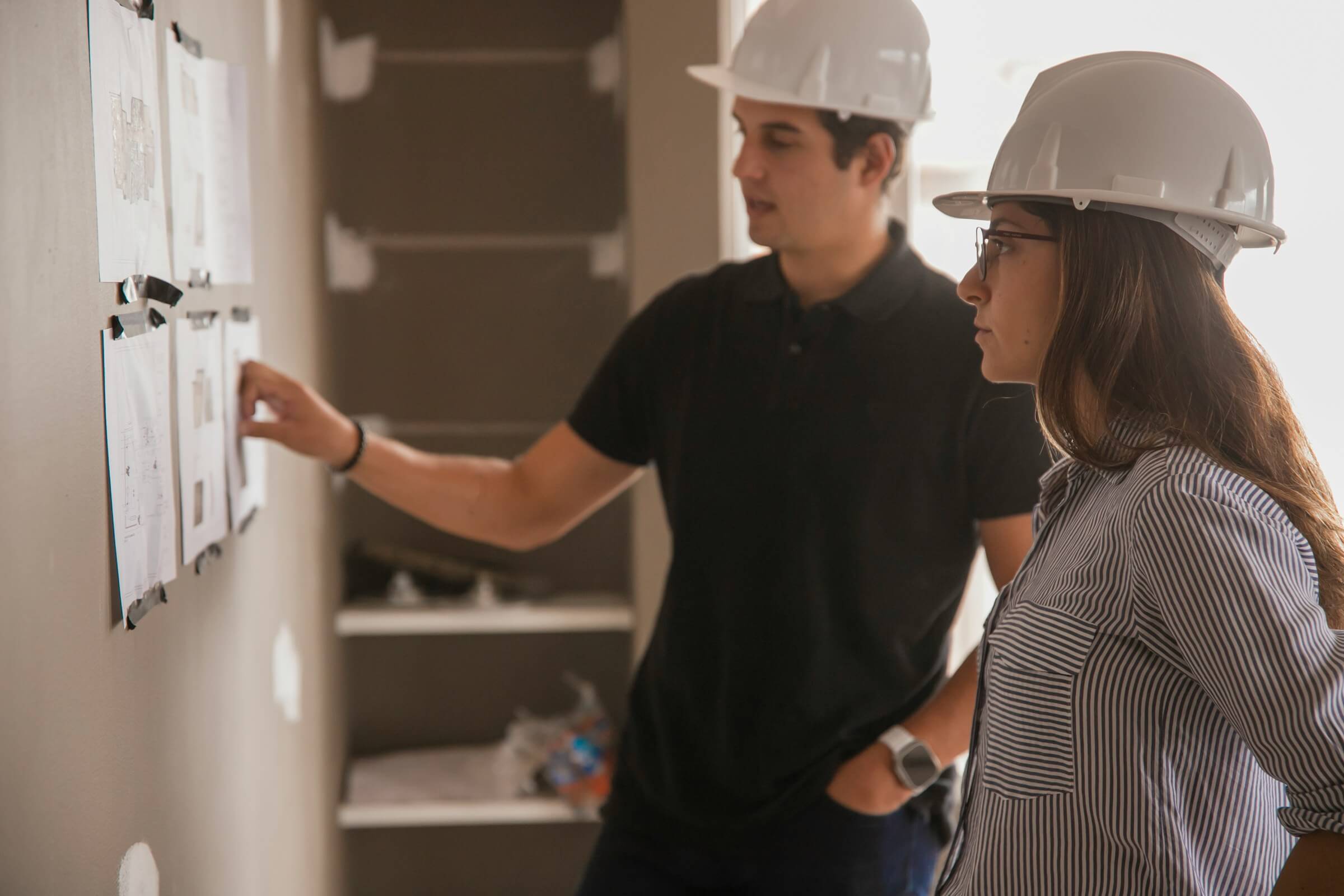
Investing in property is a big step, full of promise and potential pitfalls. Naturally, you want everything to go smoothly and according to plan, right? But let’s face it, finding the right builder can feel like a whole new project on its own. So, you’re asking yourself, “How do I know a reliable builder from a rogue one?” Your time and effort in searching and evaluating builders are incredibly important, and we understand that. That’s why we’d like to lend you our expertise to guide you through this crucial process.
WHERE TO FIND THE RIGHT BUILDER?
Whether building a home or renovating an existing property, finding the right building team to work on your project is pivotal for its success. There are a few ways how you can kickstart the search and shortlist reliable builders:
- Ask for recommendations: Reach out to trusted sources such as your architect, family, friends, and people whose opinions you trust. Their first-hand experience and insights can guide you in selecting a reputable builder. Consider asking specific questions about the builder’s communication, reliability, and quality of work.
- Explore online platforms: Expand your search by diving into online platforms. Local websites, forums, and social media groups can be a valuable source of information, providing insights into builders operating in your area.
Take the time to read reviews and testimonials and approach them with a critical eye. Not all online reviews are genuine, and some may be artificially inflated—it’s no secret that a company can just pay to generate a good review. So be discerning and look for consistency in feedback and cross-reference information where possible.
HOW TO KNOW IF A BUILDER IS RELIABLE?
1. CONDUCT BACKGROUND RESEARCH
You’ve spotted a builder who seems promising, but before taking the next step, thorough research into their background is essential:
- When was the company founded? Knowing a company’s foundation date gives insight into its experience and stability. While newer companies can still be professional and competent, they may lack a track record of completed projects and relevant experience. They might also be missing customers’ feedback. Without this information, you could be hiring a builder who is inexperienced or unreliable, which could lead to delays, cost overruns, and even legal issues. Opt for builders with a proven track record with similar projects and positive customer feedback.
- Is it a registered company? Verify the company’s registration status by consulting the Companies House for details on its directors. In the UK, all limited companies must register with Companies House. Registered businesses must comply with legal and regulatory standards, while transparency in publicly available information is a signal of reliability. A company. A company that provides publicly available information is generally more transparent and reliable.
- Verifiable and relevant experience. Try to find a builder with relevant experience and completed projects. For example, if you’re planning an HMO conversion, ensure the builder has completed similar projects. Experience in specific types of projects indicates familiarity with relevant regulations and potential challenges, reducing the risk of delays or errors.
- Who are they working with? A builder’s network of partners, subcontractors, and suppliers reflects their reliability and professionalism. Established relationships with reputable professionals in the industry contribute to smoother project execution and better outcomes.
- Small details matter: Pay attention to whether their email domain shows the company name or is just a standard one, like Gmail or Yahoo (more suitable for personal use). Such a small detail can offer valuable insights into a builder’s professionalism and attention to quality.
- Customer feedback: Check their website and social media presence for information and genuine customer feedback. Remember that while fraudsters may fabricate reviews, you can cross-reference their reviews against blacklists and registers for unreliable builders.
The HMO Architect team can help you find and select a builder suitable for your HMO development and access our selected network of building companies.
2. CHECK THEIR QUALIFICATIONS
Before appointing a building team, it’s crucial to verify their qualifications, registrations, trade affiliations, and relevant certificates —a reputable builder will be happy to provide you with any details you need before formalising the agreement. So, let’s review some of your options when checking a builder’s credentials:
- Council Approval: Typically, councils maintain a list of approved traders or have trading standards departments that provide information on registered builders. This list can help verify if a builder is registered and authorised to undertake construction work in the UK. This step ensures compliance with local regulations and quality standards.
- CSCS Card: The Construction Skills Certification Scheme (CSCS) card is an essential qualification that demonstrates a builder’s competency in health and safety practices. Request to see the builder’s CSCS card; this ensures they possess the necessary skills and knowledge to carry out construction work effectively.
- Trade Affiliations: Builders may be affiliated with professional organisations or trade associations that uphold industry standards and best practices. Contacting these organisations allows you to verify the builder’s membership status and assess their commitment to professionalism and ethical conduct.
- Insurance Coverage: Builders should have adequate insurance coverage to protect against potential risks and liabilities during construction projects. Requesting details of their insurance policy allows you to confirm the validity of their coverage and ensure adequate protection for your project. This step safeguards against potential financial losses and legal complications.
3. INTERVIEW
Once you’ve completed your initial background checks and determined that the builder appears reputable, it’s time for a face-to-face meeting or conference call.
- During this interaction, observe the professionalism of the builder and their team and assess if there’s good chemistry. Since you’ll be collaborating for an extended period, a positive relationship can help reduce project-related stress.
- Ask detailed questions about the project scope and their past experiences.
- Request photos or site visits to view completed projects firsthand. Finally, ask over client referrals and consider contacting them directly to see whether they’re satisfied with the job.
10 QUESTIONS TO ENSURE YOU KNOW WHAT TO EXPECT FROM A BUILDER (AND HOW RELIABLE THEY ARE)
- Can you provide references from past clients and examples of completed projects similar to mine?
- How long have you been in the construction business, and how many projects have you completed?
- Are you able to provide proof of insurance and licensing?
- How do you typically communicate during the project, and how often can I expect updates on progress?
- How do you handle issues or changes during construction?
- Can you offer a detailed estimate for the project (including all materials and labour costs)?
- Will you provide a written contract outlining the scope of work, timeline, and payment schedule?
- What safety measures do you have in place to prevent accidents on the job site?
- How do you ensure quality control throughout the construction?
- What guarantees do you offer on your workmanship and materials?
Be precise when it comes to gathering information. This list is your starting point, ask all project-specific questions and make sure you have all your concerns addressed.
10 PRO TIPS ON HOW TO AVOID FRAUD

It’s crucial to acknowledge that, even if you have followed all the previous steps, there might still be a risk of encountering fraud. To safeguard against potential scams, exercise caution when dealing with the financial aspects of your project. What would we recommend you do?
- Understand VAT rates: Construction works are generally subject to 20% VAT taxation apart from a few exemptions. HMO, for instance, is subject to a 5% VAT.
Question discrepancies: if you notice that a builder is charging 20% VAT on your HMO project, you can kindly ask him to reduce it. - VAT Confirmation: Get the VAT provided by the company and check if this is valid by calling the HMRC’s VAT Helpline.
- Request thorough quotes: Ensure quotes detail material costs, labour fees, and VAT charges.
- Obtain written estimates, including project breakdown and timelines.
Watch out: Rogue builders offer unusually low quotes and suggest starting work immediately. A good builder is usually busy enough and doesn’t start sooner than a few months down the line. - Insist on a comprehensive contract: A contract must outline work scope, specifications, deadlines, and payment terms. Having a contract improves your legal position, and it’s essential to a business transaction. Watch out: If a builder says the contract is unnecessary, it’s a bad sign. Cut the deal right away. We should also mention that some builders might not honour the contract for smaller projects. Why? Because bringing a builder to court for a few thousand pounds is not worth it. You might spend a lot more money and not achieve a fair case resolution. That’s why finding the right builder from the beginning is essential.
- Keep a record: If you talk to a builder on the phone or face-to-face, get it documented as well. If any dispute develops, don’t discuss it via social media; use email —this way, you’ll have an official record of the situation.
- Get bank coordinates: Verify the sort code and account number and beware of suspicious financial channels (some builders prefer to be paid via specific card types, which are typically used by scammers).
- Avoid cash transactions: Paying in cash increases the risk of being scammed, blackmailed, or involved in tax avoidance. Watch out: In cash transactions without legal documentation, clients lack protection. In such a situation, you won’t be able to have a guarantee of work done or take them to court in case of disputes.
- Limit upfront payments: Don’t pay large amounts in advance. First, transfer a small amount to check if the bank coordinates the builders shared are the right ones. Complete the transaction once the builder confirms the receipt of the amount. This will help you avoid or at least minimise the risk of financial losses to scammers.
Hint: A reliable builder won’t ask for more than a 10% deposit. Negotiating 5% deposits on HMO projects with a construction cost of less than £500,000 is quite common. - Stage payments: Pay the instalments only after each phase is completed. Your architect can help you check progress on site and give you the green light to make the payments at each stage.
5 COMMON PITFALLS (AND REMEDIES) TO KNOW BEFORE WORKING WITH A BUILDER
SMALLER PROJECT, BIGGER RISK
Projects with a construction cost of less than £500,000 are more susceptible to encountering rogue builders. The reason is simple. It is easier for them to walk away after receiving partial payment with minimal risk of facing legal action from the clients. Litigation can be prohibitively costly. Clients are usually dissuaded from going to court as they risk spending more time and funds without the guarantee of recovering even some of their money.
Taking all necessary steps during the initial research will help you find a competent and reliable builder and minimise the risk of potential fraud or setbacks later on.
CONVENIENCE OVER GOALS
Builders often prioritise what is convenient for them rather than what benefits the project. Your architectural team can help ensure your builder stays on track and adheres to the project timeline.
LOSING MOMENTUM
Some builders may lose interest in the job towards the end of the construction process because there is less money remaining for them. Since they have already received a substantial upfront payment, their incentive fades.
To reduce the chances of this happening, we suggest awarding them additional payments at the end of the job if they finish on time and budget.
NEGLECTING TIME FRAMES
Less professional builders usually fail to follow a timeline and may find excuses to justify why they’re late. Other factors, such as delays caused by suppliers or subcontractors, can also contribute to this.
Before starting your project, it’s prudent to ask during the interview about the number of ongoing projects a builder is managing. This insight will give you an understanding of potential delays. However, it’s essential to recognise that builders typically work on multiple projects simultaneously, so don’t expect your project to be the only one.
BARGAINS OVER QUALITY
For many property investors, this is a hard-earned experience: Miscalculating the actual value of quality builders can be costly. Good builders often have a 20-30% higher price than their cheaper counterparts.
Opting for a cheaper service may seem economical initially, but consider the potential additional costs in terms of delays, nerves, and headaches. You may end up paying more to see your project completed. Make quality services part of your budgeting process.
WHAT HAPPENS WHEN SOMETHING GOES WRONG?
When unexpected challenges arise during your project, knowing your rights and the avenues available to address them effectively is crucial. Here’s what you can do when things don’t go as planned:
- Seek Support: Reach out to Consumer Advice, Trading Standards, Citizens Advice, HMRC or a solicitor for guidance and assistance in resolving disputes or grievances. These resources offer valuable support to navigate complex legal matters.
- Document Everything: Maintain detailed records of any issues or unsatisfactory work encountered during the project. These records serve as evidence and can strengthen your case if you need to take further action. Be diligent in registering any concerns or discrepancies to ensure clarity and accountability.
- Know Your Rights: Familiarise yourself with your rights as a consumer and ensure that the builder adheres to contractual agreements and industry standards.
- Report Fraud or Criminal Activity: In critical situations —such as fraud or criminal activity— report the matter to the police or Action Fraud.
Finding THE IDEAL BUILDER: WHAT COMES NEXT
Finding the right builder marks only the start of your journey. Navigating the entire construction process can be challenging and stressful. That’s why having a reliable power team by your side is crucial, especially when the stakes are high. I hope these recommendations, born from years of experience and a wealth of successful projects backing us, help you find the perfect builder for your property confidently and efficiently.
If you’re looking for seamless progress and peace of mind in your project, we’re here to assist you every step of the way. Reach out for tailored support to turn your property vision into reality.
Need guidance from an architect team that has empowered hundreds of people to secure planning permission nationwide?
Experience our in-depth webinar series covering every facet of HMO development, from how to choose the perfect builder to optimising your property investment. Check out our upcoming sessions and snag your spot today!
Giovanni is a highly accomplished architect hailing from Siena, Italy. With an impressive career spanning multiple countries, he has gained extensive experience as a Lead Architect at Foster + Partners, where he worked on a number of iconic Apple stores, including the prestigious Champs-Élysées flagship Apple store in Paris. As the co-founder and principal architect of WindsorPatania Architects, Giovanni has leveraged his extensive experience to spearhead a range of innovative projects.




